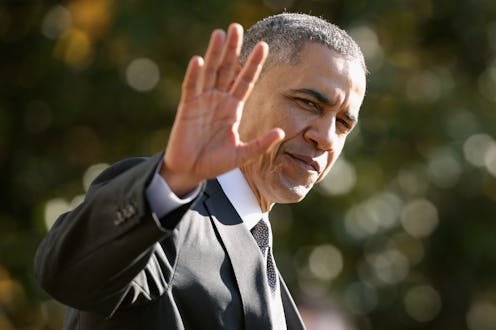News
Obama Made A Secret Move On Iran
When Iranian President Hassan Rouhani started making friendly gestures toward the West shortly after his election last June, it was a surprise to, well, everybody. After all, the U.S. and Iran have been on bad terms for over three decades, with Iran’s last president fond of calling for America’s annihilation, so it seemed to be quite an abrupt turnaround. But now it all makes a bit more sense, as it’s now being reported that shortly after Rouhani took office, U.S. President Barack Obama began quietly easing the economic sanctions the West had placed on Iran years ago, a token of good faith that may have paved the way for Rouhani’s conciliatory actions.
A bit of back story. You hear a lot about the “sanctions” against Iran, but the details of how they work are usually brushed over. One component involves diminishing Iran’s ability to conduct significant financial transactions by blacklisting the intermediaries through which those transactions normally pass. So, for example, the U.S. (the Treasury Department, in particular) might identify a bank that Iran has been using in conducting its oil sales, and ban that bank from SWIFT, the international hub for global financial transactions — essentially isolating it from the global banking community. This not only eliminates Iran’s ability to utilize this particular bank, but also, more importantly, discourages any other banks from involving themselves with Iran, lest they be blacklisted as well.
Now, in the six weeks prior to Rouhani’s election, the U.S. had identified more than 100 entities — individuals, banks, marine vessels, and so on — and placed them on the blacklist. But since Rouhani was elected almost five months ago, the U.S. has only blacklisted a total of 10 (six individuals, four companies). In this way, the U.S. was able to relax its grip on Iran’s economy slightly by allowing it more venues through which to conduct financial transactions, while at the same time continuing, technically, to enforce all of the sanctions that were already in place.
The Wall Street Journal reported earlier this week that an easing in U.S.—Iranian relations has secretly been in the works for years; the subtle relaxing of sanctions would seem to be a logical component of this.
That being said, the thaw apparently hasn’t yet led to a breakthrough in negotiations on Iran’s nuclear program. Despite a last-minute appearance by U.S. Secretary of State John Kerry, the six countries currently negotiation with Iran in Geneva didn’t reach an agreement today, as many had hoped. But the talks are being extended until tomorrow, with Russian Foreign Minister Sergei Lavrov joining the fray, so that’s a sign, if nothing else, that the countries involved very much do want to reach some sort of accord.
